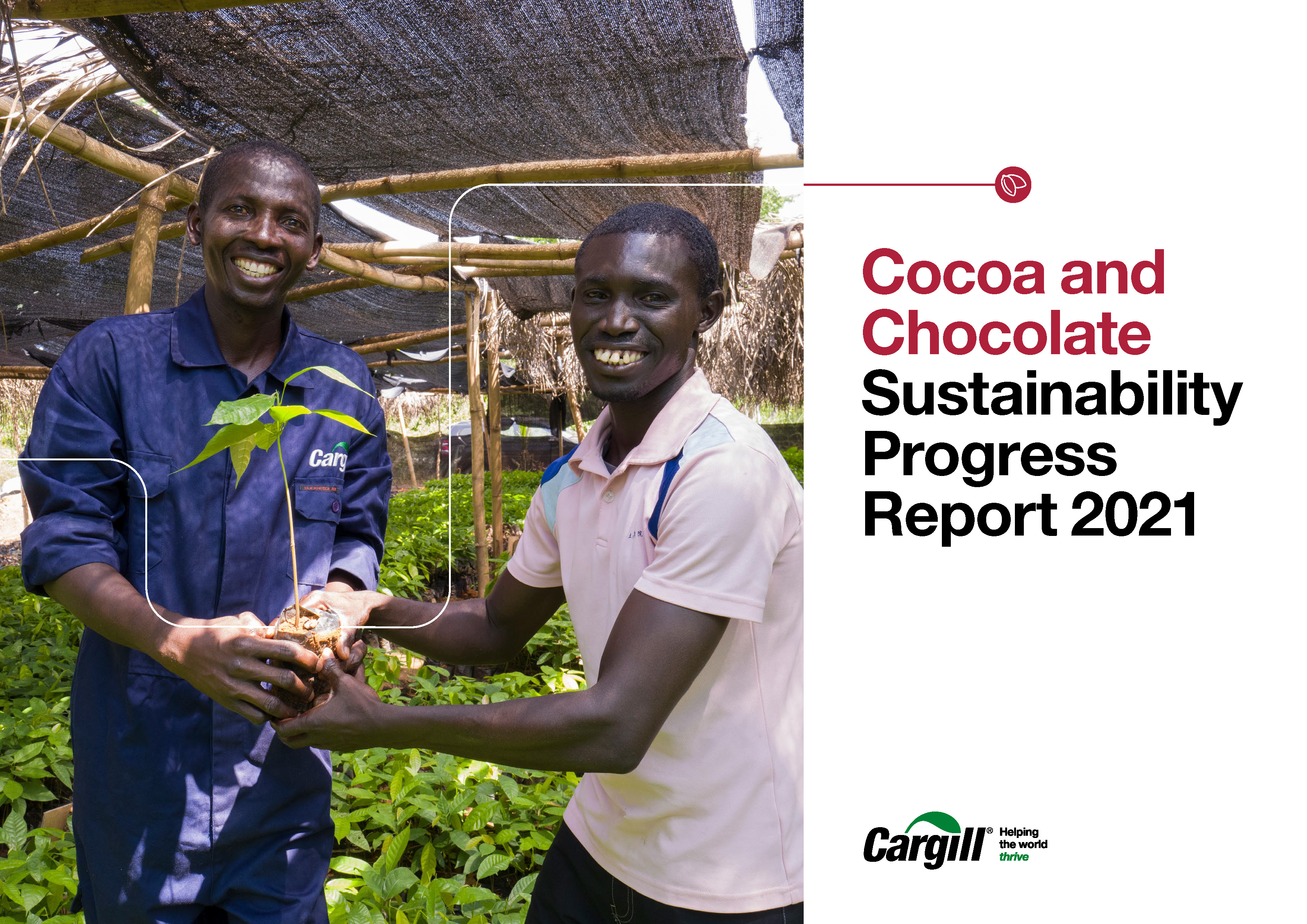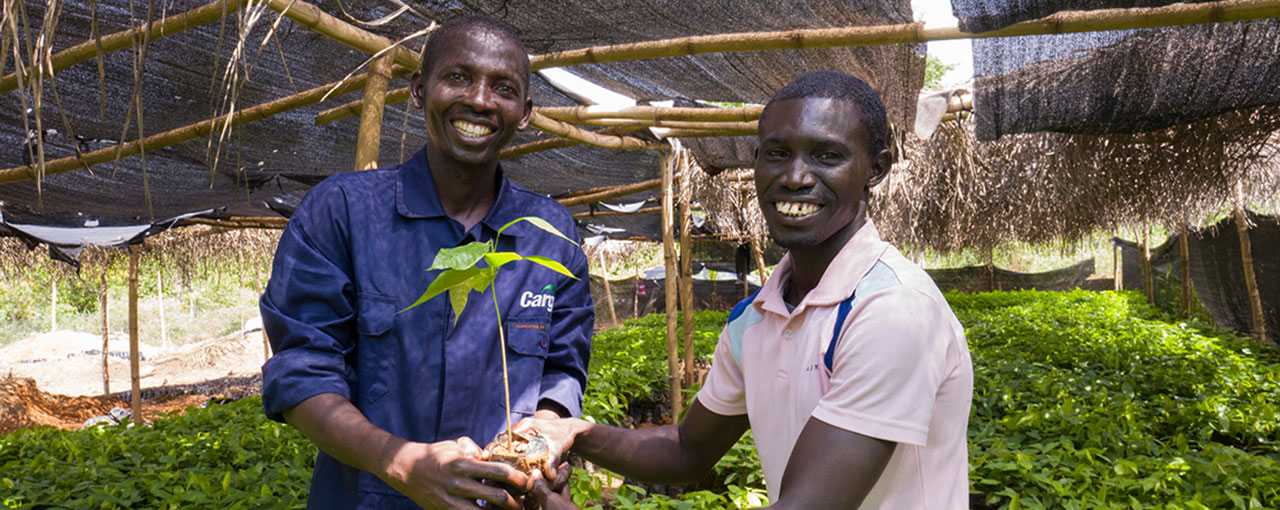Cocoa Sustainability Progress Report
2021 Cocoa Sustainability Progress Report
As one of the world’s leading cocoa and chocolate producers, we act at the heart of the cocoa sector, connecting all stakeholders in the value chain and taking into consideration the many distinct yet interconnected issues that feed into the future sustainability of the sector. The 2021 sustainability report was included on the List of GRI Standards Reports as well as on the GRI Sustainability Disclosure Database.

For previous versions of the Cocoa Sustainability Report, click here >>
 Along with the publication of our 2021 Sustainability Progress Report, Harold Poelma, President of the cocoa & chocolate business reflects and looks forward to the challenges and progress made.
Along with the publication of our 2021 Sustainability Progress Report, Harold Poelma, President of the cocoa & chocolate business reflects and looks forward to the challenges and progress made.
As a company operating in today’s interconnected world, it’s our responsibility to create long-term value for all. Key events in 2021 underlined our commitment to sustainability – with COP26 centralizing important agreements to address the climate crisis and the International Labor Organization and Alliance 8.7 marking 2021 as the International Year for the Elimination of Child Labor, calling for a greater sense of urgency from governments and the industry to protect children. More ambitious actions plans are needed to effectively tackle the world’s most pressing sustainability challenges, especially in light of the effects of the COVID-19 pandemic.
Cargill’s ability to respond to environmental and social challenges is shaping our company now, just as it has over the past 150 years. Taking action is integrated into the way we do business, enabling every employee to bring our purpose to life. This year’s Cocoa and Chocolate Sustainability Progress Report clearly shows how the integration of sustainability issues continues to evolve in the sector and within our business. Across the board, our supply chain initiatives are more comprehensive than ever, taking action on multiple sustainability topics. For example, we support the empowerment of women with technical training and access to finance and we provide farmers with agroforestry support; both initiatives contribute to more solid and diversified household incomes.
Supply chain due diligence offers an important tool for transparency, continuous improvement, and accountability in supply chains. Due diligence requirements, if designed appropriately, can reinforce the way companies develop solutions together with suppliers and other partners. Technology supports our efforts as it enables transparency and traceability of cocoa and chocolate for us, our customers, and their consumers. To date, the cocoa in our direct supply chain is traceable to the first point of purchase. This year, 117,111 farmers in our direct supply chain are delivering cocoa through first-mile digital traceability systems, up from 89,399 last year. Additionally, we continue to lead in sourcing certified sustainable cocoa, which represents almost half of all the cocoa we source. (*)
Our reporting tools, such as CocoaWise™, provide visibility on provenance and impact and have been enriched with more features, such as cocoa and chocolate product carbon footprints. Progress in cocoa communities has proven to not be straightforward as issues remain highly interconnected. Collaboration and joint evaluation of progress remain vitally important. This was my last year as chair of the European Cocoa Association, a role I was honored to serve as, and which made me believe even more strongly in driving transformation together. The impact we make through dialogue, sharing learnings, and working together is far greater than the sum of its parts. It already shows in partnerships such as the Child Learning and Education Facility (CLEF) and the Early Learning and Nutrition Facility (ELAN), led by Jacobs Foundation, the Cocoa & Forest Initiative, and the Roadmap to Deforestation-free Cocoa in Cameroon that was launched in 2021. I stay optimistic thanks to efforts such as the EU cocoa talks, the sector welcoming the European policies, and producing country government initiatives like national traceability systems and landscape approaches.
Cargill is committed to transparency – in our own operations and across our global supply chains. As we continue to increase our transparency, we expect to publish a new companywide ESG report in late 2022. The upcoming report will integrate our supply chain progress reports into a global, unified report – providing updates on Cargill’s ESG strategy as well as cocoa and chocolate specific details previously found in the annual Cocoa Sustainability Progress Reports.
Together, our shared purpose is clear. And in a turbulent world, we continue to make steady progress towards a thriving cocoa sector for generations to come.
Sincerely,
Harold Poelma
President, Cargill Cocoa & Chocolate
(*) Third-party certified sustainable refers to certification standards such as Rainforest Alliance and Fair Trade.
If not mentioned elsewise, all West Africa photos in relation to sustainability are by Sandrine Bénitah « @Sandrine Bénitah »

